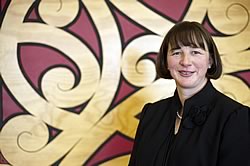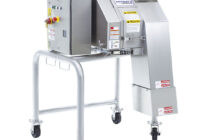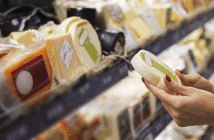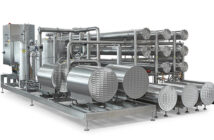
Dunedin-based traceability company Oritain presented new research at the Horticulture New Zealand conference in July showing just how easy it is to identify the origin of some food, even after it has been frozen.
Oritain chief executive Helen Darling spoke to the Process Vegetable Product Group's conference to explain what her company does and to show just how far science can go in helping growers protect their products and their reputation.
Helen's message was very simple – origin is important, and reputation is critical. Today's customers have a lower level of trust of food safety than ever before, and they use origin as one way of assessing its safety.
They also want to know that the manufacturers, processors and retailers selling food have ways to ensure that what they are selling, is actually what they say it is. The work that Oritain has being doing has attracted the interest of Horticulture New Zealand, because it shows just how easy it is to prove the origin of a food product. As growers should know, HortNZ has been campaigning for the introduction of mandatory country of origin labelling for food in this country for several years. We believe New Zealand growers are at a competitive disadvantage in their own domestic market, because New Zealand shoppers are not being given the ability to identify and choose between buying local and imported product.
One of the reasons we believe successive New Zealand governments have gone out of their way to avoid dealing with this problem is because they have been assured by government officials that it would be impossible to regulate mandatory country of origin labelling effectively. They say there is no point in bringing in a law you can't monitor, cheaply and accurately. But thanks to Helen and Oritain, it is definitely possible. It's extremely accurate, and not expensive.
The way the Oritain system works – and this is the very basic non-scientific version – is that once you know the elemental 'make up' of the product you are testing or monitoring, then you can compare it with similar products from all over the world, and they will all be distinctly different.
This is because no matter where in the world you are growing, the elements which finally finish up in the product, both from the soil and the water, all have their own 'fingerprint', virtually as different as one human fingerprint is from another.
The challenge HortNZ put to Helen and her team was to test frozen vegetables to see if it was possible to make this clear distinction between products even after they'd had been harvested, frozen and packaged.
Helen's team tested two different frozen vegetable products. Our test was simple, first is it possible to tell the difference between the origin of the products in the bag? And, most importantly, can you tell if any of the products are from New Zealand? The answers were absolutely, yes.
They sampled three different vegetables from each pack: peas, corn and carrot. They did isotopic analysis of the samples, specifically for carbon, hydrogen and nitrogen. The results indicated a clear differentiation between the make up of the Chinese products and the New Zealand ones, in all three crops.
The study concluded that not only can the origin of frozen vegetables be authenticated, but improved differentiation will be able to be achieved if they widened their sampling from growing regions.
So what can we do with this information? Helen's advice to New Zealand fruit and vegetable growers is to do the basic 'fingerprint' testing now, before someone tries to pass of either their own product, or imported product, as yours. She recommends it even be considered as an industry-wide project, doing analysis for New Zealand product. This has the potential to save New Zealand product from becoming targeted in international food scandals, like the recent German e-coli outbreak.
Helen and her husband Mike (who is the general manager) set up Oritain in 2008. Their clients now include several horticulture businesses. They run a conference every year called GoTrace, which aims to create a forum for regular discussion about developments in the world of food provenance and supply chain integrity. This year the conference is at Te Papa in Wellington on November 1-2.




























































































